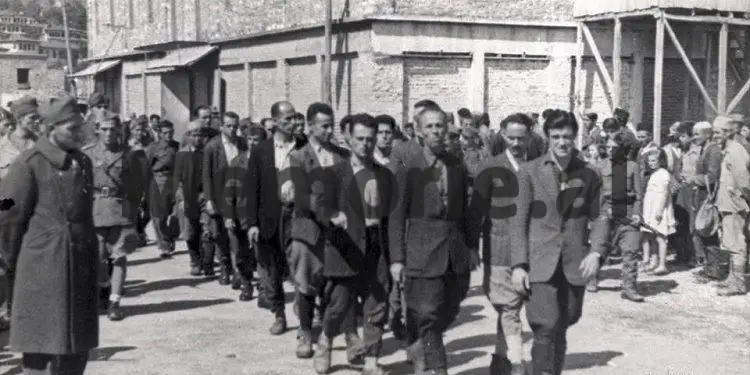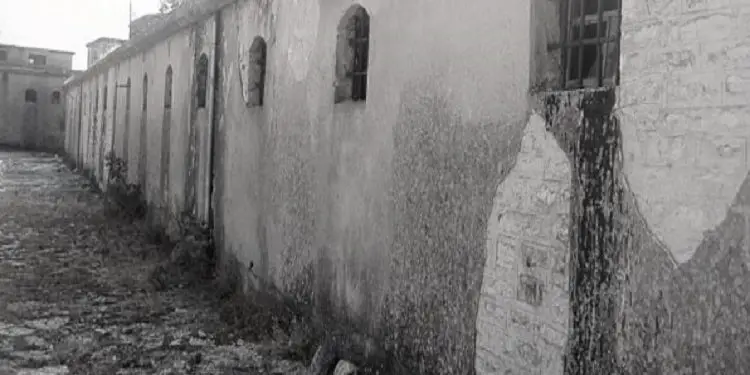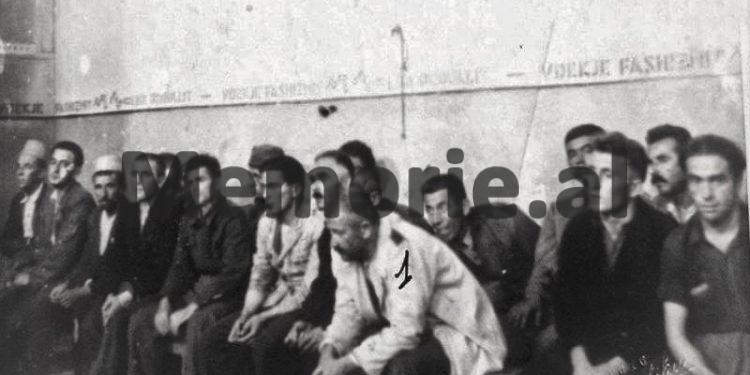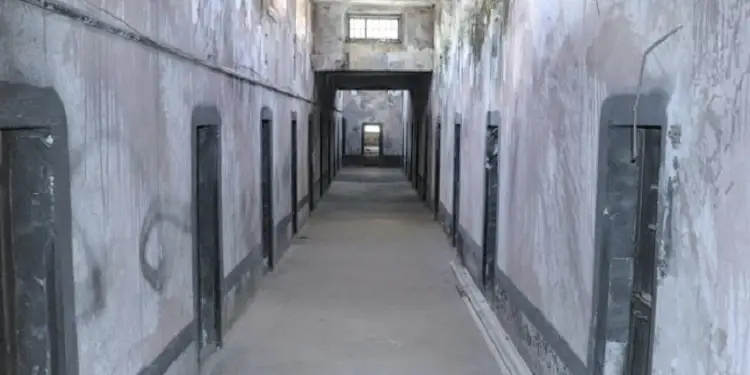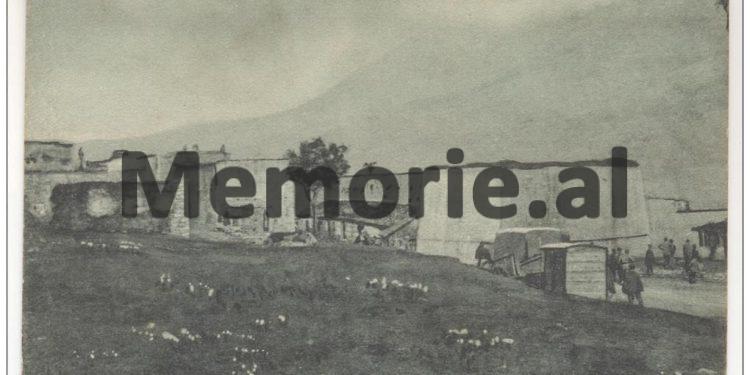By Mehmet Beqir Shehu (Tepelena)
Memorie.al / Mehmet Beqir Shehu, or as he is known differently with the last name Tepelena, was born in Tepelena in 1931, in a family with patriotic traditions and known as Shehler clerics, where his father, Beqiri, served as the father for many years of Teke of Tepelena’s Wing, who returned his teke as the main base of the partisans of that province. Mehmeti was initially a supporter and participant in the Anti-Fascist Movement, which was led by the communists, where his brother, Zenel Beqir Shehu, was initially the commander of the partisan detachment of the ‘Velikolli’ of Tepelena and then with the creation of the “Baba Abaz” Battalion, appointed his commissar. Likewise, Zeneli was also a participant in the Congress of Përmet, where during his sessions; he opposed the red five-pointed star in the partisan flag, which was opposed by Enver Hoxha, who called Zeneli, “kapadai”. Apart from Zeneli, Mehmeti was also in the partisan ranks, at that time only 14 years old, together with the other three brothers, thus becoming five brothers in the partisan ranks. But shortly after the end of the War, after not being selected in the lists of candidates for the deputy in the elections of December 1945, Zeneli resigned as the sub-prefect of Tepelena and returned to the village, taking up agricultural work. This was the reason why he was arrested by the State Security and after they held him under torture for some time, in the Castle of Gjirokastra, they sentenced him to death and executed him on January 14, 1948. Similarly, shortly after the arrest of Zeneli, in 1946, Mehmeti was also arrested, who was sentenced three times, suffering a full 19 years in communist prisons, without ever going to a family meeting and without any kind of letter correspondence with them. Mehmet Beqir Shehu, managed to see the collapse of the communist regime and after the 90s, he began to write the memories of his tragic life, in the prisons of the dictatorial communist regime of Enver Hoxha, leaving in manuscript some very interesting materials, parts of which we have selected for publication in this article.
XEMIL MUSTAFARAI: THE MAN WITH THE HEART OF A LION
It was November of 1946. While I had done the investigation in Tepelena, by the former chief spy Xhezo Makashi, (former head of the Department of Internal Affairs of Tepelena. They sent me to the Gjirokastra Castle, where I would continue the investigation again.
From Tepelena they started me on foot, accompanied by three policemen. The weather was very bad (winter 1946). All the bridges, roads and everything had been destroyed and washed away by the rain.
I was 15 years old. Night took us to Hani i Subashi. The police here put me in a military car and dropped me off at Çerçizi Square in Gjirokastër.
I was soaked from the rain and very cold. The policemen took me to a police district, which was near the Castle, to the north-east of it. They locked me in a dungeon-dump, which was without light.
I didn’t know where to sit. The wet body and the cold were taking my soul. How I didn’t die that night was a miracle of God.
In the morning the police came, took me and took me to the Military Court. The military prosecutor, Dorac Ago Çela, was waiting for us there. Agua gave the policemen a writ and ordered them to take me to the terrible prison of the Castle.
They took me to the Castle. Its entrance was a long and dark tunnel. Everything there screamed from the acoustics of those corridors, no matter how much you spoke. They took me up to the second floor, where the prison and its directorate were.
After checking again, they put me between two large iron gates. After a frantic call, the guard came from inside and took me away. He led me to the great hall of 7 windows. It was full of prisoners, sitting on the cement floor. Anyone who had a layer of clothing would sit on it. What horror!
All those dead and sad faces inside had an angelic, generous and manly soul. They approached me and asked me my name and where I came from. After they found out who I was, they informed my brother, who was in another room, Zenel Beqir Shehu, who had been arrested since June 1946. Zenel had appeared in court and was acquitted.
They did not release him from the courtroom even later, violating every reason and legal provision. As it seemed, it was expected by the bloodthirsty Enverites, led by Bedri Spahiu, that the date 14.01.1948 would come, that they would execute him.
At the beginning, in prison, I met Maliq Shehu, with whom I was the same age and we shared a room with him. I also got to know Haziz Qamili, who was about 35 years old, with a manly body and shadow of the labi kollos. I watched from the isolation rooms, when the heroine, Hava Golem, was aired.
She was a handsome woman, plump and dressed in black; serious woman, with the pride and manly appearance of Labëria. I never saw that woman sad, but proud and shy.
I didn’t know Feride. In room No. 51, the boy with the heart of a lion, Xhemil Mustafaraj, was isolated. This one was about 27 years old, handsome and proud. When he went out to the bathroom, he gave the impression of a guy who was waiting for his marriage and not his death in the Kobze dungeon, no. 51.
Havaja and all the others were arrested on the charge that in Gjirokastër “they were going to assassinate Shefqet Peçi, for blood feud of Ismail Golem”. This whole charge, beginning and end, was fabricated.
The trial was presided over by Bexhet Mema and prosecutor Ago Çela. All five victims of Enverism were grouped together. Havaja as “president” and all the others had been brutally tortured for six consecutive months, by the furious savages (investigators) of the Department of Internal Affairs, Gjirokastër, led by the executioner Jashar Menzelxhiu.
These enraged wolves, having failed to defeat all five of their victims, brought them to a mock trial and convicted them on trumped-up charges:
Xhemil Mustafarain by death (shooting), confiscation of property and loss of rights; Hava Golem with 20 years in prison; Haziz Qamilin with 30 years in prison; Feride Kamanin with 5 years in prison; Malik Shehu with 5 years in prison.
The good-hearted boy, Xhemil Mustafaraj, when he was given the death sentence, proudly answered the criminal Bexhet Mema: “Down with communism! I never die from your cruel bullets.”
He immediately took out a razor from his pocket and cut the veins of his hands. All the participants in the trial were moved by the heroic courage of this 27-year-old boy from Labëria. The trial was suspended; the suicidal boy was immediately taken to the hospital and recovered for the time being.
At the next trial, he was again sentenced to death. They isolated him in the waiting room, no. 51. Xhemil Mustafaraj was waiting for death there, together with a wise and honest old man from Tatzati, (whose name I do not remember), but if I am not mistaken, his name was Ismail Haki Tatzati.
By the end of December 1946, the final decision came from the Supreme Court. Communist criminals of the Internal Affairs Branch of Gjirokastra came to implement this decision. The execution was usually done after midnight.
When the big gate was opened and, especially, that of room No. 51, all the prisoners heard the door slam. They were anxiously waiting for the chaos that would happen in room no. 51.
Xhemil Mustafaraj got up and as soon as he saw the murderers at the door, he took in his hand a tin knife that he had prepared earlier and said to the soldiers: “No! I will not die from your bullets.” He quickly lifts his shirt and cuts his stomach.
Pulls out the intestines, rips them out and dies. The sadists did not have the courage to catch him, but remained frozen. The dead body of the hero Xhemil Mustafaraj, together with the wise and honest old man from Tatzat, were taken, executed and buried in the same grave!
So, this was the genocide that the furious Enveristo-Communist wolves: even the dead bodies re-executed them!
Haziz Qamili fell to the ground and died on the spot in 1947, forced to work for the establishment of the Internal Affairs Branch of Gjirokastra.
These are unhealed wounds in the hearts of every convicted and persecuted political person who has experienced them.
…Let us never forget our fellow sufferers, these wounds inflicted on us and our comrades by the communist persecutors. They also separated us from our closest people, who today feel guilty for their attitude towards us.
This is how my grandson, Eqrem Shehu, writes about that time, may he never come to our country again:
“I read the interview of my uncle Mehmet Beqir Shehu and felt pain for that noble man. He is the youngest among the five sons of Sheh Beqir, my grandfather. He was 14 years old when he became a partisan along with his four brothers.
I was 8 years old when I met him in Gjirokastra prison in 1948, while he was only 17. I say I met him because we talked between the bars. He wanted to kiss us, but he wouldn’t let the police pass the iron fence.
At the end, he gave us some coins, which happened to be in his pocket, to buy kaposhka. When he got out of prison, he came to Tepelena and, together with his grandmother, supported us with bread.
We didn’t have a father. It had been months since he had been killed. In 1954, Mehmeti joined the army. We three children of Zeneli remained badly. We were taken by the uncles in Tirana, who had state functions.
We could no longer go to our little uncle. He served the army in the labor wards without looking at any of us. After a year, as declassified, we returned to Tepelena. Our house was seized by the district attorney and we settled in a hut near the house.
Uncle Mehmeti was shy to come to us in Tepelena; our mother’s arm was in a different position, but more than that, we were now shy, we were even afraid to go to him.
However, as soon as he finished the army, he was settled somewhere in Tirana with a job, and that made us very happy. Very rarely in the case of deaths in the tribe, we saw each other; we saw it with longing and with a deep sorrow in our hearts.
In 1967, the uncle is convicted again. He wrote us letters from prison, but we were silent. The class struggle was at its peak. Neither the woman who had divorced him to protect the children, nor the children was trampled in prison, nor neither were we.
He was there completely alone, without any help, just with those 400 grams corn bread. From the other prisoners, we learned how manfully he faced life, and we felt a pain in our soul and kept silent about that little uncle, who had supported us with bread.
19 years isolated in prison, 19 years isolated from all his loved ones. And when he got out of prison, we didn’t have the courage to visit him. We met after 21 years at a wedding within the tribe. It was 1990.
The dictatorship was beginning to decline. We approached him at the table where he was sitting with a glass of brandy in his hand. Our hand was shaking. There was something like a lump in our throat and we couldn’t speak.
How would that man who loved us so much, but we stayed away from him then, when he needed us so much…? But he hugged us longingly…”! Memorie.al





